When to Seek Veterinary Care for Your Chinchilla
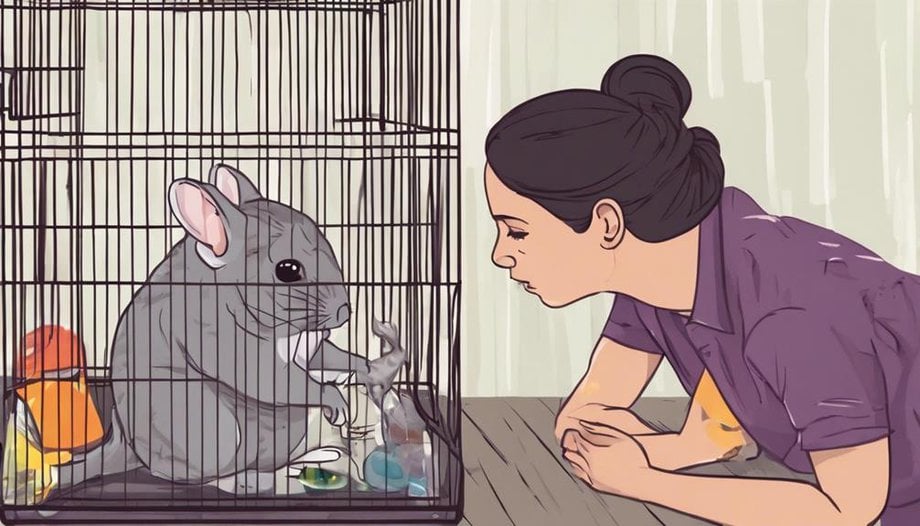
Chinchillas are small, exotic animals that require special care and attention. As a chinchilla owner, it’s important to be aware of the signs that indicate your pet may be ill. Some common signs of illness in chinchillas include changes in appetite, lethargy, diarrhea, difficulty breathing, and abnormal behavior. If you notice any of these symptoms in your chinchilla, it’s important to seek veterinary care as soon as possible.
Behavior changes can also indicate that something is wrong with your chinchilla. If your pet is suddenly more aggressive, withdrawn, or restless than usual, it could be a sign of an underlying health issue. Additionally, changes in grooming habits, such as a lack of grooming or excessive grooming, can also indicate a problem. It’s important to pay attention to your chinchilla’s behavior and seek veterinary care if you notice any unusual changes.
Regular veterinary check-ups are also important for chinchillas to ensure they remain healthy and happy. A veterinarian experienced in exotic pet care can help you monitor your chinchilla’s health and provide any necessary treatments. By being vigilant and seeking veterinary care when needed, you can help ensure that your chinchilla lives a long and healthy life.
Unusual Changes in Behavior
If your chinchilla exhibits unusual changes in behavior, such as sudden aggression or lethargy, it’s crucial to seek veterinary care promptly. Behavioral changes in chinchillas can be stress indicators or signs of underlying health issues. Unusual activity, like excessive hiding or hyperactivity, as well as disturbances in their regular sleeping patterns, could all point to a problem.
Chinchillas are usually active and curious animals, so any significant shift towards lethargy or increased aggression should raise concern. Sudden changes in behavior can indicate discomfort, pain, or illness. For example, if a typically social chinchilla becomes withdrawn or aggressive, it may be experiencing distress. On the other hand, if a usually calm chinchilla starts displaying hyperactive behavior, this could also be a cause for alarm.
Decreased Appetite or Weight Loss
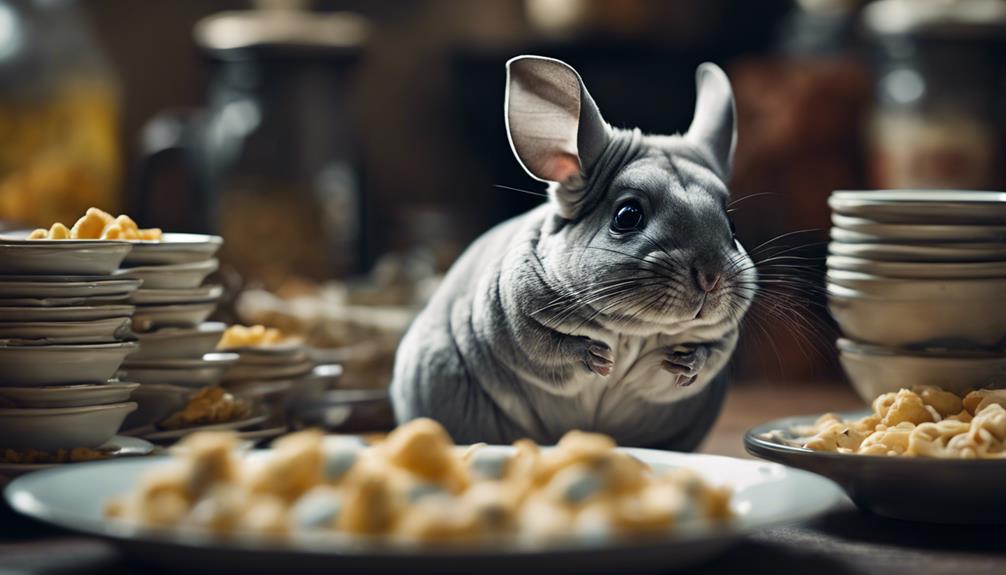
In chinchillas, a decreased appetite or weight loss can signal underlying health issues that require prompt veterinary attention. It’s essential for chinchilla owners to monitor their pets closely for any changes in eating habits or weight. If you notice your chinchilla eating less or losing weight, it’s crucial to act swiftly to address any potential health concerns.
Reasons for Decreased Appetite or Weight Loss:
- Dental Problems: Chinchillas have continuously growing teeth that can cause pain and difficulty eating if not properly worn down.
- Gastrointestinal Issues: Conditions like gastrointestinal stasis can lead to a decreased appetite and weight loss.
- Nutritional Deficiencies: Inadequate diet or lack of essential nutrients can impact appetite and weight.
- Dehydration: Chinchillas have high hydration needs, and dehydration can lead to appetite loss and weight loss.
Addressing these issues promptly with the help of a veterinarian is crucial. They may recommend nutritional supplements or adjustments to your chinchilla’s diet to ensure they meet their hydration needs and regain a healthy appetite.
Breathing Difficulties
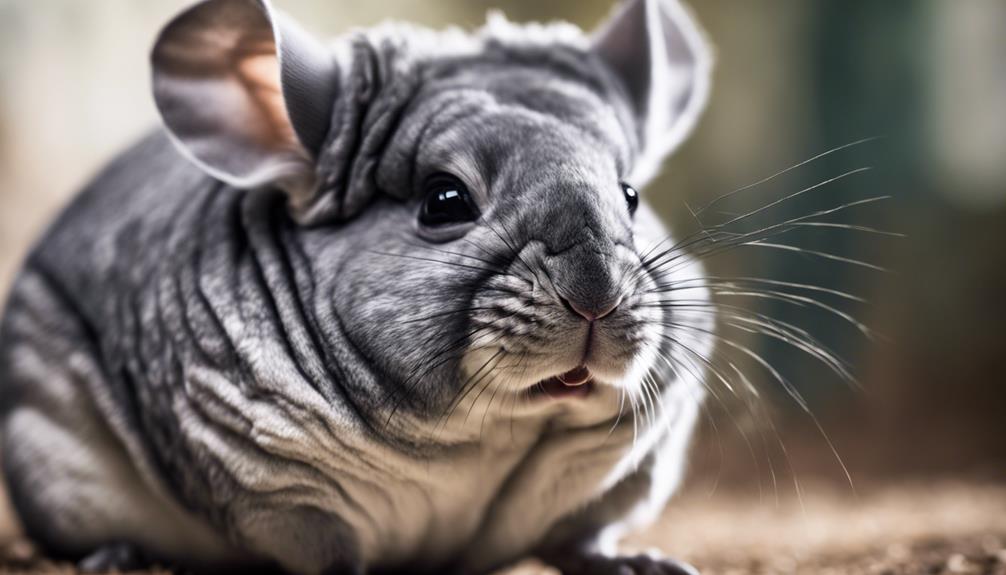
Labored breathing in chinchillas can be a sign of a serious underlying health issue and shouldn’t be ignored.
If you notice your chinchilla struggling to breathe, wheezing, or making clicking noises while breathing, it’s crucial to seek immediate veterinary attention.
Breathing difficulties can quickly escalate and require prompt medical intervention to prevent further complications.
Labored Breathing Signs
Signs of breathing difficulties in chinchillas may include a visibly increased effort in inhaling and exhaling, audible wheezing or clicking sounds, and a noticeable decrease in activity levels.
- Respiratory Infections: Chinchillas are prone to respiratory infections, which can lead to labored breathing.
- Treatment: Prompt veterinary care is essential to diagnose and treat respiratory issues effectively.
- Breathing Techniques: Ensuring proper ventilation in the chinchilla’s living environment can help alleviate breathing difficulties.
- Stress Relief: Minimizing stress factors such as loud noises or sudden changes in the chinchilla’s surroundings can aid in preventing respiratory distress.
Immediate Vet Attention
Prompt veterinary attention is crucial for chinchillas experiencing breathing difficulties to ensure timely diagnosis and effective treatment. In emergency situations, signs of distress that indicate immediate vet care for your chinchilla include gasping for air, wheezing, or abnormal sounds while breathing. Urgent care is essential if your chinchilla shows critical symptoms such as blue-tinged skin, extreme lethargy, or reluctance to move. Below is a table summarizing when immediate vet attention is necessary for your chinchilla’s breathing problems:
| Signs of Distress | Urgent Care Needed | Critical Symptoms |
|---|---|---|
| Gasping for air | Immediately | Blue-tinged skin |
| Wheezing | Urgent | Extreme lethargy |
| Abnormal breathing sounds | Prompt attention | Reluctance to move |
Eye or Nose Discharge
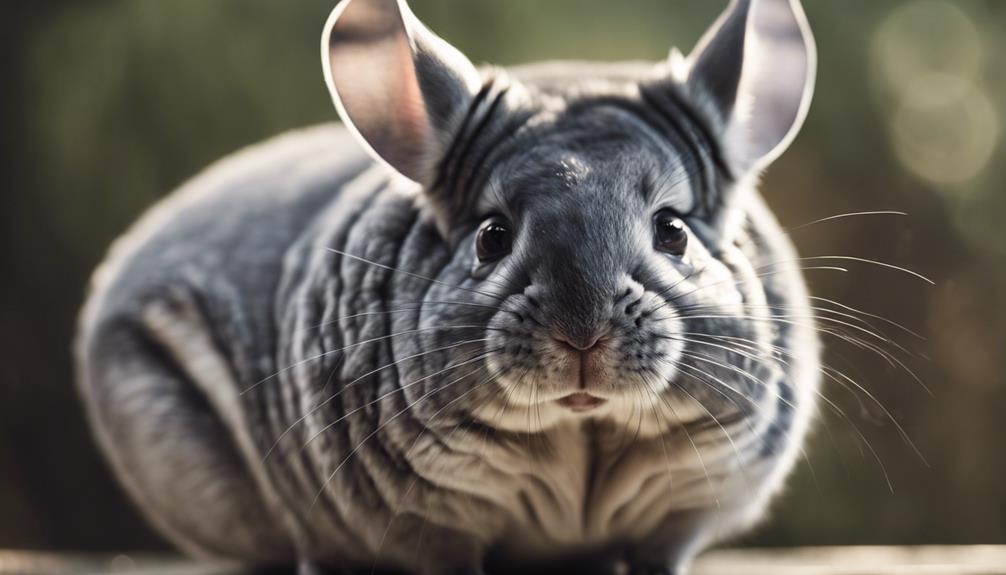
Chinchillas may experience eye or nose discharge, which can be concerning for their owners. Excessive eye watering, persistent nose discharge, or any unusual color or odor in the discharge could indicate an underlying health issue that requires veterinary attention.
It’s crucial to monitor these symptoms closely and seek professional care promptly to ensure the well-being of your chinchilla.
Excessive Eye Watering
Experiencing excessive eye watering or discharge in chinchillas is often indicative of underlying health issues that require prompt veterinary attention. It’s crucial to address these symptoms promptly to ensure the well-being of your chinchilla.
Here are some essential points to consider:
- Treatment Options:
- Consult a qualified veterinarian for a thorough examination.
- Follow the prescribed treatment plan diligently.
- Administer any medications as instructed by the veterinarian.
- Monitor your chinchilla closely for any changes in symptoms.
Persistent Nose Discharge
Addressing persistent nose discharge in chinchillas is crucial as it may indicate underlying health issues that necessitate veterinary attention. Common causes of persistent nose discharge in chinchillas include respiratory infections, dental problems, allergies, or foreign objects stuck in the nasal passages. Diagnostic tests such as physical examination, X-rays, or cultures may be necessary to determine the exact cause. If your chinchilla is experiencing persistent nose discharge, seeking veterinary care promptly is advised. Treatment options may include antibiotics for infections, teeth trimming for dental issues, or removal of foreign objects. Prevention strategies involve maintaining good hygiene in the chinchilla’s environment, providing a balanced diet, and regular veterinary check-ups to catch any issues early.
| Treatment Options | Prevention Strategies |
|---|---|
| Antibiotics for infections | Maintain good hygiene |
| Teeth trimming for dental issues | Balanced diet |
| Removal of foreign objects | Regular veterinary check-ups |
Unusual Color or Odor
Detecting unusual color or odor in eye or nose discharge from your chinchilla can be a sign of potential health concerns that warrant veterinary assessment. It’s essential to monitor your chinchilla closely for any changes in these areas, as they can provide valuable insights into your pet’s well-being.
Some key points to consider include:
- Color changes: Any unusual coloration in eye or nose discharge may indicate an underlying health issue that requires attention.
- Odor concerns: Foul or strong odors emanating from discharge can also be a cause for concern and should prompt a visit to the vet.
- Unusual fur discoloration: Keep an eye out for any abnormal coloring in your chinchilla’s fur around the eye or nose area.
- Scent issues: If you notice any strange or unpleasant scents coming from your chinchilla, especially around the eye or nose, it’s important to seek professional veterinary care promptly.
Abnormal Droppings or Urine
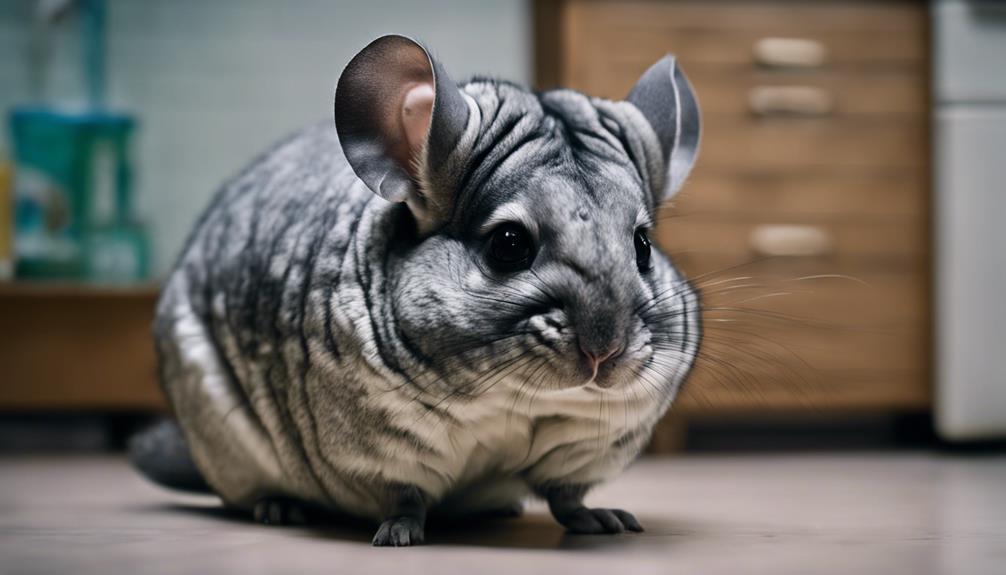
Signs of unusual fecal consistency or color along with irregular urine output in chinchillas can indicate potential health issues that require prompt veterinary attention. Digestive issues can lead to changes in fecal appearance such as diarrhea or unusually dry stools, both of which warrant a visit to the vet. Similarly, variations in urine output, like producing less or more urine than usual, can be a sign of underlying problems that need professional evaluation. Monitoring your chinchilla’s droppings and urine regularly is crucial for catching any abnormalities early. Ensuring proper hydration and a balanced diet can help prevent digestive issues and maintain healthy urinary patterns. Below is a table summarizing signs of abnormal droppings and urine in chinchillas:
| Abnormal Droppings | Irregular Urine Output |
|---|---|
| Diarrhea | Increased or decreased urine |
| Dry, pellet-like stools | Cloudy or bloody urine |
| Presence of mucus in feces | Straining to urinate |
| Changes in color | Strong odor in urine |
| Reduced fecal output | Excessive dribbling |
Hair Loss or Skin Irritation
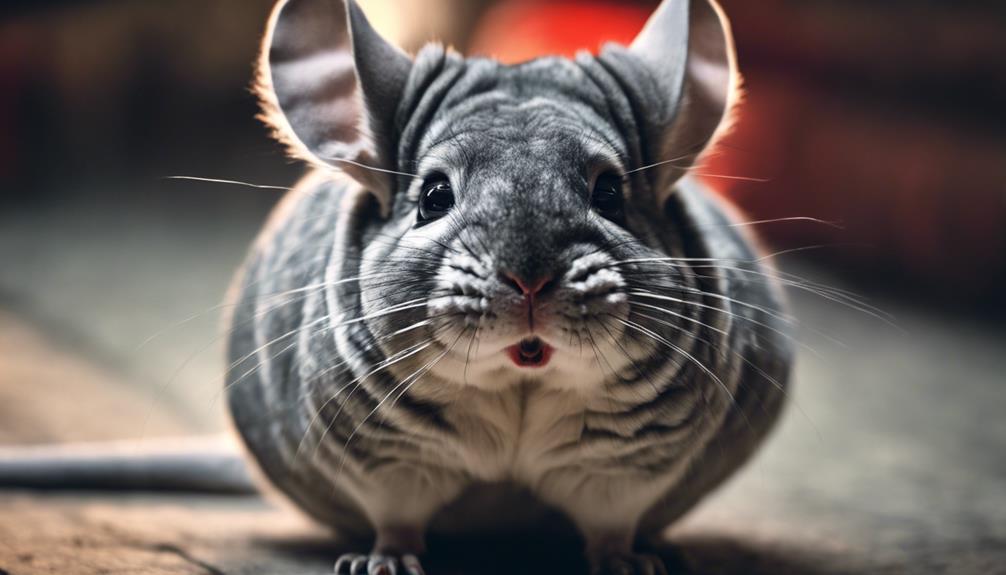
Chinchillas experiencing hair loss or skin irritation may indicate underlying health issues that require veterinary assessment and treatment. Hair loss can be a sign of parasitic infections, nutritional deficiencies, or stress, while skin irritation may result from poor grooming techniques or environmental factors. It’s crucial to address these symptoms promptly to ensure the well-being of your chinchilla.
- Treatment options: Depending on the underlying cause, treatment may include antiparasitic medications, dietary adjustments, or stress reduction techniques.
- Prevention: Regular grooming sessions and providing a clean, dust-free environment can help prevent skin issues and hair loss in chinchillas.
- Grooming techniques: Proper grooming, including dust baths and regular brushing, can help maintain a healthy coat and skin for your chinchilla.
- Environmental factors: Ensuring proper humidity levels, temperature regulation, and cleanliness in the chinchilla’s habitat can prevent skin irritation and hair loss.
Seeking veterinary care for a thorough evaluation and guidance on treatment and prevention strategies is essential when faced with hair loss or skin irritation in your chinchilla.
Dental Problems
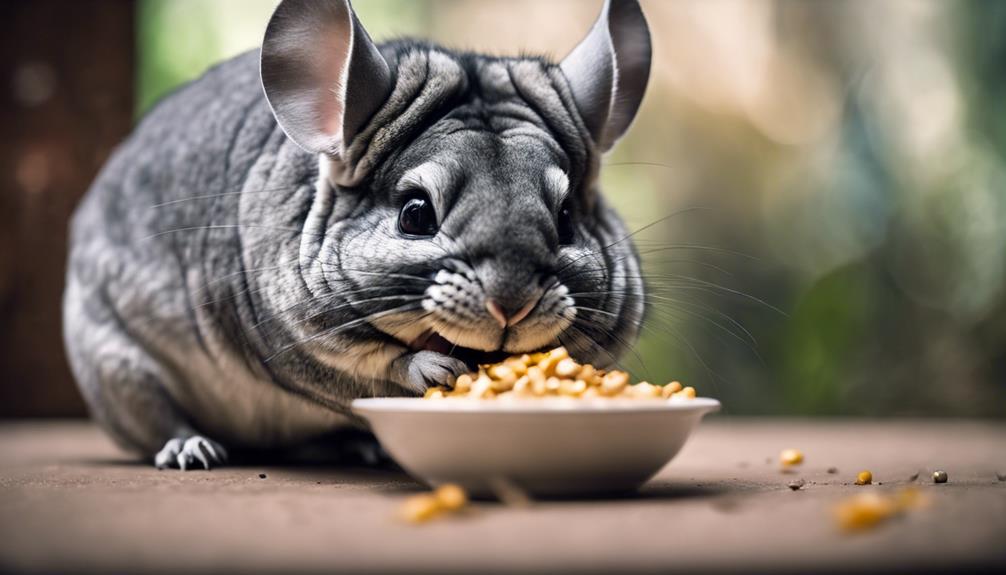
Regular dental check-ups are crucial for maintaining the oral health of your chinchilla. Dental hygiene plays a vital role in preventing dental problems in chinchillas. Chinchillas have open-rooted teeth that continuously grow, making proper dental care essential. Ensuring your chinchilla has access to chew toys and a balanced diet is key to preventing dental issues. The chinchilla’s diet should consist mainly of hay and limited pellets to aid in wearing down their teeth naturally.
It’s important to monitor your chinchilla’s eating habits as a decreased appetite or difficulty eating can be signs of dental problems. Symptoms such as drooling, weight loss, or pawing at the mouth should prompt an immediate visit to the veterinarian. Dental problems in chinchillas can lead to serious health issues if left untreated. So, proactive prevention through regular dental check-ups and a suitable chinchilla diet is crucial for maintaining their overall well-being.
Frequently Asked Questions
Can Chinchillas Suffer From Mental Health Issues Like Anxiety or Depression?
Chinchillas, like other animals, can experience behavioral changes that may indicate mental health issues such as anxiety or depression. Stress indicators and emotional well-being should be monitored closely to ensure their overall health.
How Can I Tell if My Chinchilla Is Experiencing Pain or Discomfort?
When a chinchilla shows behavioral changes like decreased activity or appetite, it may signal pain or discomfort. A thorough health assessment and physical examination by a veterinarian can help identify any underlying issues and provide appropriate care.
Are There Any Home Remedies I Can Try Before Seeking Veterinary Care for My Chinchilla?
Before seeking veterinary care for a chinchilla, it’s important to be cautious when considering natural remedies or DIY treatments. While some options may help, there are limitations and risks to be aware of to ensure the chinchilla’s well-being.
Can Chinchillas Get Colds or Other Illnesses From Humans?
Like a dance between partners, zoonotic risks can transfer illnesses from humans to chinchillas. Their delicate immune systems face vulnerabilities against human colds. Seek veterinary care if symptoms persist to safeguard both species’ health.
What Can I Do to Prevent Dental Problems in My Chinchilla?
To prevent dental problems in a chinchilla, focus on dental hygiene. Provide chew toys to help wear down teeth naturally. Ensure a balanced diet with enough roughage. Regularly check for overgrown teeth or signs of dental issues to seek timely veterinary care.











